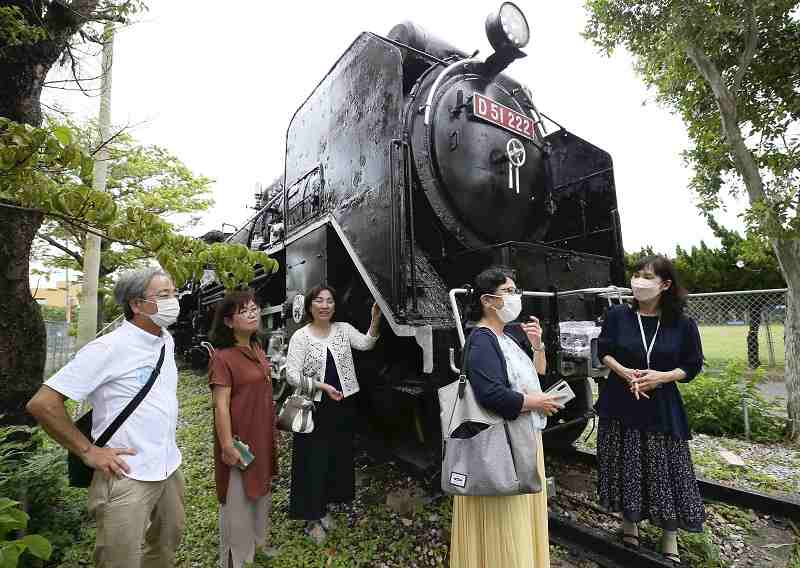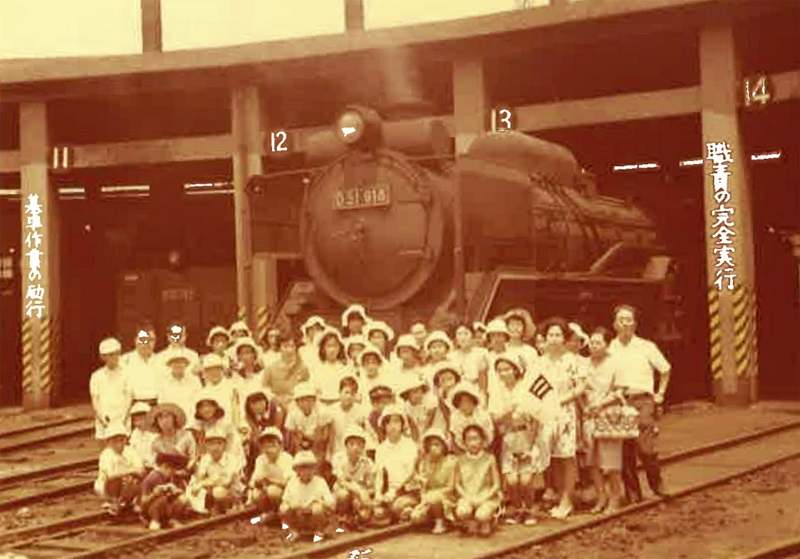
From left, Satoru Shiroma, Eriko Shiroma, Rieko Yamazato, Naoko Teruya and Chikako Kawaguchi gather on April 27 in Naha’s Yogi Park in front of the steam locomotive sent 50 years ago.
2:00 JST, May 19, 2022
The majestic steam locomotive never ran on any tracks in Okinawa Prefecture, never carried any passengers, never pulled any freight. But for the past half-century it has been sitting in a park in Naha as a symbol of Okinawa’s link to the rest of Japan upon its post-war return to Japanese sovereignty.
The D51 locomotive — affectionately called “Degoichi” after the pronunciation for D51 — had been sent from Kitakyushu in 1973, the year after Okinawa was returned to Japanese control, and displayed in Naha’s Yogi Park, where it remains to this day.
It all came about through the efforts of a former employee of the now defunct Japanese National Railways (JNR), who had arranged for a group of elementary school students from Okinawa, which had no railways, to view the steam engine in Kitakyushu.
Seeing the children’s fascination with the massive machine, Tatsujiro Yamada, now deceased, then worked to have it permanently sent to Okinawa by raising donations.
Fifty years later, a number of the former elementary school students who were first involved in the project spoke about it with The Yomiuri Shimbun, saying they cherish and want to pass on the story of the locomotive, which represents goodwill from all over the country.
The D51 on display measures about 20 meters in length and weighs about 90 tons. It was manufactured at the Kokura plant in Kitakyushu in 1938, and ran on the JNR’s Kagoshima and Nippo lines for more than 30 years before being retired.
Although it was scheduled to be scrapped, it was instead transported 600 kilometers by sea from Kagoshima to Naha in March 1973. It was put on display in Yogi Park, which is adjacent to Naha Civic Hall where the ceremony to mark Okinawa’s reversion to Japanese sovereignty had been held the previous year.
Start of the saga
The saga started eight months earlier in July 1972, when a group of elementary school students from Okinawa ventured to Kitakyushu.
Yamada, a staff member at JNR Moji Station travel center, came up with the idea of inviting children from Okinawa, which had returned to Japan, as a gesture of goodwill.
Seventy-two fifth- and sixth-graders traveled by boat and train to Kitakyushu on a nine-day trip. For five of the eight nights, they stayed in the homes of Moji railway employees and others.
Yamada set up a full schedule of events that included going to an amusement park, a zoo and a professional baseball game. He also took the children to a JNR train depot, where they were surprised to see a large locomotive for the first time. They took pictures in front of the popular Degoichi.
“It was so big, it looked like a building,” recalled Naoko Teruya, 60, who stayed at Yamada’s home during the trip.
In thank-you letters written upon returning to Okinawa, the children wrote, “I want a steam locomotive in Okinawa,” and “I want my friends in Okinawa to see it.”
Yamada and his colleagues then called on JNR employees throughout the country to donate money for the transportation of a retired locomotive.
When the press got word of the project and wrote about it, donations started coming in from the general public, and a total of ¥14 million was raised.
Soil and stones were gathered from prefectural capitals around the country and sent to Okinawa to be spread under the rails at Yogi Park.

Elementary school children visiting from Okinawa in 1972 pose for a picture in the train yard in Moji Ward, Kitakyushu.
Long-lasting relationships
Some former JNR employees and students have remained in contact to this day.
Satoru Shiroma and his wife Eriko, both now 60, were attending different elementary schools when they participated in the Kitakyushu trip.
Satoru, who stayed at the home of Masayuki Katayama, now deceased, refers to him and his wife Eiko, 91, as “father and mother.” Before his honeymoon, Satoru visited the couple to tell them of his marriage.
When their son was 10 years old, the Shiromas arranged for him to stay with the Katayamas during a summer vacation, much as they had done as children decades earlier.
“I used to think Okinawa was a distant island, but now it is a place where my ‘family’ lives,” Eiko said. “I never thought our relationship would continue for 50 years.”
For Satoru, the encounter with the Degoichi had a profound effect on his life, as he had a career with the Naha municipal government in which he was involved in the operation of the Okinawa monorail and a project for a streetcar that the city is considering introducing.
“Seeing the Degoichi at that time and the memory of riding a train probably had an influence [on my career choice],” said Satoru, who retired in March.
“The Degoichi symbolizes the message of ‘Let’s strive together’ from the people of the main island as a gift to Okinawa,” he said. “Okinawa is still facing many problems, but I hope people around the country will care about us like they did in those days.”
In March, Chikako Kawaguchi, 61, who was another of the elementary school students and now works at the Ishimine community center in Naha, invited the Shiromas and others to give a lecture on the circumstances surrounding the donation of the locomotive.
About 20 people attended the event and were said to have listened with great interest.
“As time goes by, many people even in Okinawa do not know the story [behind the locomotive],” Kawaguchi said. “We would like to continue to spread the word about this goodwill gesture from all over the country.”
Top Articles in Society
-

Man Infected with Measles May Have Come in Contact with Many People in Tokyo, Went to Store, Restaurant Around When Symptoms Emerged
-

Australian Woman Dies After Mishap on Ski Lift in Nagano Prefecture
-

Woman with Measles Visited Hospital in Tokyo Multiple Times Before Being Diagnosed with Disease
-

Foreign Snowboarder in Serious Condition After Hanging in Midair from Chairlift in Nagano Prefecture
-

Record-Breaking Snow Cripples Public Transport in Hokkaido; 7,000 People Stay Overnight at New Chitose Airport
JN ACCESS RANKING
-

Japan Institute to Use Domestic Commercial Optical Lattice Clock to Set Japan Standard Time
-

Israeli Ambassador to Japan Speaks about Japan’s Role in the Reconstruction of Gaza
-

Man Infected with Measles May Have Come in Contact with Many People in Tokyo, Went to Store, Restaurant Around When Symptoms Emerged
-

China Eyes Rare Earth Foothold in Malaysia to Maintain Dominance, Counter Japan, U.S.
-

Prudential Life Insurance Plans to Fully Compensate for Damages Caused by Fraudulent Actions Without Waiting for Third-Party Committee Review





















